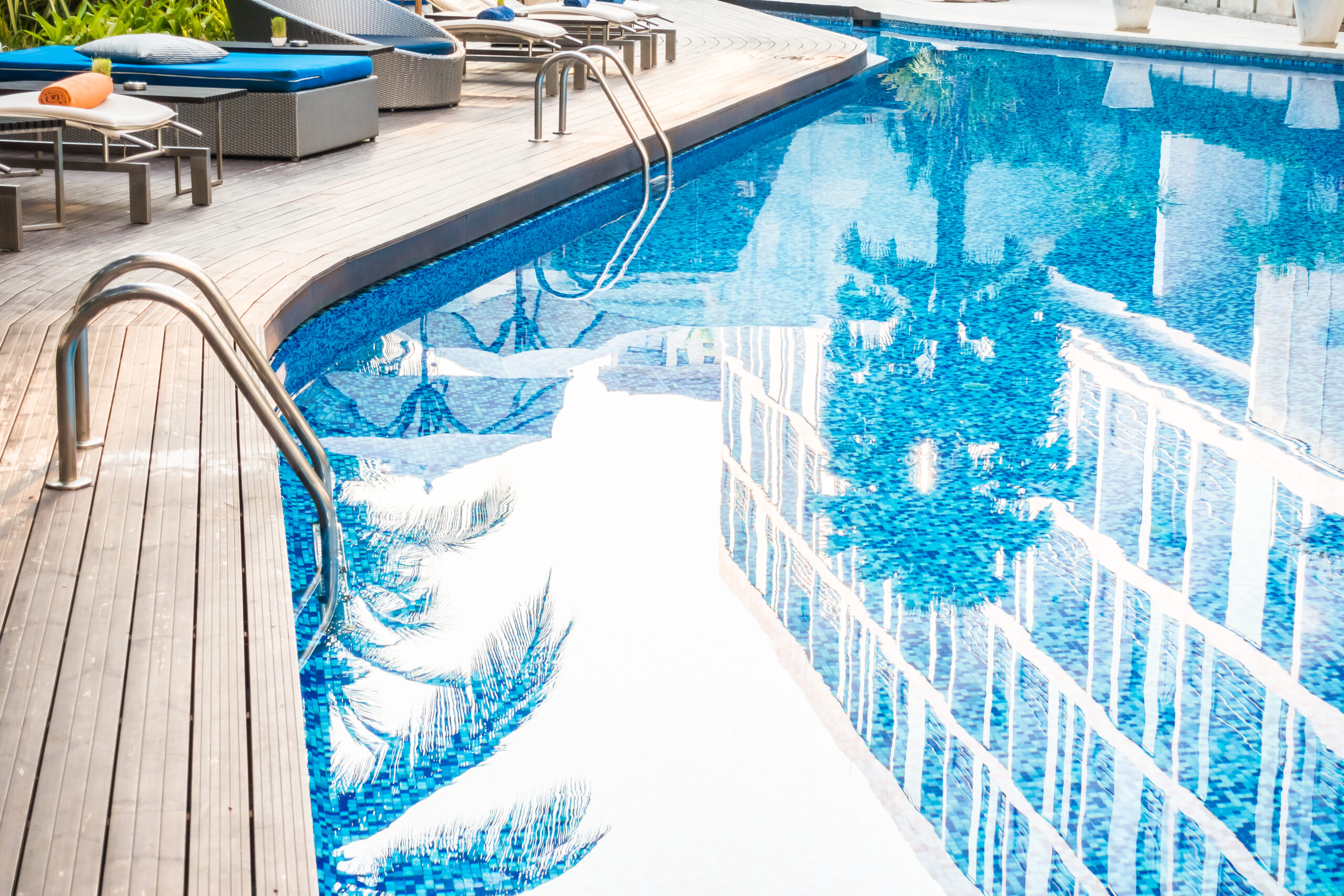Everything You Need to Know About Gunite in Pool Construction
When it comes to creating a beautiful, long-lasting pool, gunite pools have become the go-to choice for homeowners looking for durability, customization, and style. In this guide, we’ll dive into everything you need to know about gunite in pool construction, including how it’s made, where it works best, maintenance needs, and a look at gunite pool costs in areas like Long Island, Brooklyn, and Queens.
What is Gunite?
Gunite is a mixture of cement, sand, and water that’s applied through a high-pressure hose, creating a solid, durable shell. This material has become a top choice for pool construction because it allows for freeform shapes and designs, making it ideal for custom pools.
How is a Gunite Pool Constructed?
The process of building a gunite swimming pool involves several stages:
- Excavation: The area for the pool is excavated according to the chosen design.
- Rebar Framework: Steel rebar rods are installed to create the shape and structure of the pool. This reinforcement adds strength and stability.
- Gunite Application: Gunite is then sprayed over the rebar framework, forming a hard, dense shell. This step allows for flexibility in shapes and sizes.
- Curing: The gunite pool shell requires several days to cure and harden.
- Finishing Touches: Once cured, the pool is finished with a plaster, tile, or pebble layer, which adds both texture and color.
What Environments Are Best for Gunite Pools?
Gunite pools are suitable for a variety of climates and can handle significant temperature changes, making them an ideal choice for regions like Long Island, Brooklyn, and Queens. These areas experience seasonal shifts, so the durability of gunite is an advantage. Unlike other pool types, gunite pools are less prone to cracking under temperature changes, making them a great long-term investment for New York homeowners.
Gunite Pool vs. Fiberglass: What’s the Difference?
One common question is the difference between a gunite pool and a fiberglass pool. Here are some key points:
- Durability: Gunite pools are more durable and can last 30+ years with proper maintenance. Fiberglass pools may need to be resurfaced after 15-20 years.
- Customization: Gunite allows for more design flexibility and can be built in any shape or size, while fiberglass pools come in pre-molded shapes.
- Maintenance: Fiberglass pools require less maintenance but offer limited design options. Gunite pools need regular upkeep but allow for complete customization.
Gunite vs. Shotcrete: What’s the Difference?
Both gunite and shotcrete are forms of concrete, but they differ in application:
- Gunite is a dry mix where water is added at the hose nozzle during application, allowing for control over the consistency.
- Shotcrete is a wet mix that’s pre-mixed with water before application. While it’s also used in pool construction, gunite is preferred for its control and strength, especially in custom designs.
Are Gunite Pools More Expensive?
Yes, gunite pools typically come with a higher initial cost compared to vinyl or fiberglass pools. This is largely due to the complex installation process and high-quality materials involved.
- Gunite Pool Cost: On average, a gunite pool can cost anywhere from $35,000 to $70,000 in Long Island, Brooklyn, and Queens. Customized features like waterfalls, seating, or unique shapes can increase the price.
- Gunite in Pool Price vs. Long-Term Value: While the upfront cost may be higher, a gunite pool’s longevity and flexibility can make it a better investment over time.
Maintenance of a Gunite Swimming Pool
While gunite pools are durable, they do require regular maintenance to keep them in top condition. Here are some maintenance tips:
- Regular Brushing: Brush the walls and floor of the pool weekly to prevent algae growth and keep surfaces clean.
- Chemical Balancing: Keep the pool’s pH, chlorine, and calcium levels balanced to protect the pool surface and ensure safe water quality.
- Annual Inspections: Check for cracks, wear in the plaster layer, and any other structural issues annually to address problems early.
- Plaster Resurfacing: Gunite pools may need resurfacing every 7-10 years to maintain a smooth finish, which also prevents cracks and leaks.
Gunite Pool Cost vs. Other Pool Types in Long Island, Brooklyn, and Queens
The cost of a gunite pool can vary based on several factors, such as the size, design complexity, and any additional features you want to include. Here’s a comparison of gunite pool costs versus other pool types:
- Vinyl Pools: $20,000 – $40,000, with less customization but quicker installation.
- Fiberglass Pools: $25,000 – $60,000, offering lower maintenance but limited design options.
- Gunite Pools: $35,000 – $70,000, offering high durability, complete customization, and flexibility.
Is a Gunite Pool Right for You?
When weighing the decision between a gunite pool and other options, consider the following factors:
- Customization Needs: If you want a unique pool design tailored to your space, gunite is the best choice.
- Budget: While gunite pools are more expensive, their longevity may provide better value over time.
- Climate: For areas like Long Island, Brooklyn, and Queens, where temperatures vary widely, the durability of a gunite pool is advantageous.
Conclusion: Gunite Pools Offer Beauty, Flexibility, and Long-Lasting Value
Investing in a gunite swimming pool can add value and beauty to your property, providing a custom, durable swimming space that stands up to the test of time. While the gunite pool cost may be higher, the benefits of customization, resilience, and longevity make it a worthwhile option, especially for homeowners in Long Island, Brooklyn, and Queens.
If you’re considering a pool that fits your aesthetic and will last for decades, a gunite pool is an excellent choice. Be sure to consult with professionals in pool gunite application to explore the options and get an accurate estimate for your dream pool!
Gunite Pool Services by The Mudjacking Contractor
For those looking to construct, maintain, or repair a gunite pool, The Mudjacking Contractor offers expert gunite pool services. With a team skilled in handling all aspects of gunite pool construction, including custom shapes and finishes, they ensure a high-quality result that meets your design needs. Additionally, their maintenance and repair services help keep your gunite pool in pristine condition, addressing any structural or aesthetic concerns that arise over time.
Explore how The Mudjacking Contractor can help you build or restore a beautiful, durable gunite pool. For more details, contact them by calling (347) 284-0280.
Frequently Asked Questions
What is the Lifespan of a Gunite Pool?
With proper maintenance, a gunite pool can last 30 to 50 years, making it one of the most durable pool options on the market. Occasional plaster resurfacing every 7-10 years will keep it looking and performing like new.
Thinking long-term for your pool? Reach out at www.zavzaseal.com or call (631) 980-1800.
What is the Difference Between Gunite and Plaster Pools?
While gunite forms the solid structural shell of a pool, plaster is the finishing layer applied over gunite. Plaster adds a smooth, watertight surface and aesthetic finish to gunite pools. This combination provides a durable, customizable, and visually appealing pool option.
Learn more at www.zavzaseal.com or call us at (631) 980-1800.
Is Gunite Better Than Vinyl Pools?
Yes, gunite pools are often preferred for their durability and customization options compared to vinyl pools. While vinyl pools are less expensive initially, gunite pools offer longer lifespan, greater design flexibility, and increased home value. Ready to invest in a gunite pool?
Visit www.zavzaseal.com or call (631) 980-1800.
Why is it Called Gunite?
The term “gunite” comes from the application method—a high-pressure “gun” sprays the dry concrete mixture, which mixes with water at the nozzle. This process creates a strong, dense material ideal for pools and other structures.
For more pool-building insights, contact us at www.zavzaseal.com or call (631) 980-1800.
Is Gunite Better Than Concrete?
Gunite and concrete are both forms of concrete, but gunite’s spray application provides more control and strength, particularly for complex shapes. It’s also more adaptable, making it the preferred material for custom pool designs.
Discover how gunite can bring your pool vision to life at www.zavzaseal.com or call (631) 980-1800.
What is Another Name for Gunite?
Gunite is also known as “dry shotcrete,” a term that highlights its dry mix process and application method. This material’s strength and flexibility make it a top choice for pool construction. Curious if a gunite pool fits your needs?
Get in touch at www.zavzaseal.com or call (631) 980-1800.
What is Another Name for Pool Plaster?
Pool plaster is also commonly referred to as “marcite.” This finish, applied over the gunite shell, gives pools a smooth, polished surface and is essential for sealing the pool.
Explore your options with Zavza Seal at www.zavzaseal.com or call (631) 980-1800.
Does Gunite Crack?
Gunite is strong and resistant to cracking, but like any material, it can crack if not properly maintained or exposed to extreme pressure or temperature changes. Regular maintenance helps keep your gunite pool in top shape. Need expert advice on pool care?
Visit www.zavzaseal.com or call (631) 980-1800.
Do You Have to Plaster a Gunite Pool?
Yes, plastering a gunite pool is essential as it provides a smooth, watertight finish that protects the gunite shell and gives the pool its attractive appearance. Plaster resurfacing is recommended every 7-10 years.
Get professional guidance for your pool at www.zavzaseal.com or call (631) 980-1800.

